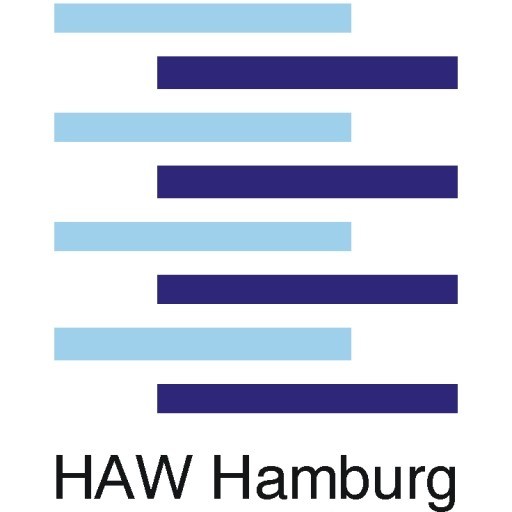Photos of university / #HAWHamburg
During their research semester, students will participate in a research project conducted either at the university or at another institution focusing on health research. Students will gain practical skills and teamwork experience, and will learn how to run a project in the field of health sciences research. The training will be supervised by a professor and accompanied by a colloquium.
The programme culminates in the writing of a Master's thesis. The aim is to formulate and analyse a problem by choosing a suitable study design and appropriate study methods. Concepts and methods learned during the programme will be applied.
Educational organisation
The number of students is limited to a maximum of 25, therefore seminars and small group work with tutorial support is possible in all modules.First semester: five modules out of the following are required (6 CPs each):
- Concepts and Dimensions of Health Sciences and Public Health and Statistical Data Analysis
- Ethics and Epistemology
- Diversity in Health
- Family, Community and Occupational Health
- Health Economics and Global Health
- Infectious and Non-Communicable Diseases Epidemiology
Second semester: five modules out of the following are required (6 CPs each):
- Health Behaviour and Epidemiological Research
- Occupational and Health Promotion Research
- Health Economics and Health Systems Research
- Advanced Study Design and Biostatistics
- Instrument Development, Validation and Advanced Qualitative Study Design
- Research and Project Management
Third semester (30 CPs):
Research Project in Health Sciences with Colloquium
Fourth semester (30 CPs):
Master's Thesis in Health Sciences Research
Study abroad unit(s)
We also offer a double degree (German/French) in cooperation with Université Lille II.Forms of assessment
Written examinations, assignments and presentations in the first and second semesters; research report and presentation in the third semester; Master's thesis in the fourth semesterCourse objectives
Graduates are able to assess and analyse problems in health sciences in order to develop solutions (policy formulation), as well as to implement appropriate interventions and to evaluate the measures adequately.The programme has a strong research orientation and an international character.
Language requirements
TOEFL: at least 550 (paper-based), 220 (computer-based), 83 (internet-based)IELTS: at least band 6 or equivalent
German: Proof of German level B1 is mandatory and must be included with the application. Students must continue to learn German during the first semester and must reach level B2 by the beginning of the second semester. Lectures are held in English; the research semester (third semester) requires a good knowledge of German.
Academic requirements
- Bachelor's degree (with 180 ECTS or equivalent) in health sciences or a similar field, with an academic grade equivalent to the German grade 2.5
- Graduate Record Examination (GRE) (for applicants from non-EU countries)
Students who completed their school education outside Germany must have their certificates approved by uni-assist (http://www.uni-assist.de) BEFORE applying to the HAW Hamburg. The pre-registration documentation from uni-assist must be sent with the application forms, etc., when applying to the HAW Hamburg. Please be advised that this process can take six to eight weeks, so please apply early.
Want to improve your English level for admission?
Prepare for the program requirements with English Online by the British Council.
- ✔️ Flexible study schedule
- ✔️ Experienced teachers
- ✔️ Certificate upon completion
📘 Recommended for students with an IELTS level of 6.0 or below.
Enrolment fees
Semester contribution of approx. 318 EUR (as of June 2016). This fee includes a semester ticket for unlimited travel on Hamburg's public transport system.Costs of living
Hamburg is a relatively expensive city. Depending on your lifestyle, you should expect living costs of 700 to 900 EUR for rent, food, and other expenses. In addition, there will be costs for materials, which (depending on the degree programme) will range between 125 and 250 EUR per semester.Job opportunities
You should plan to be able to study in Hamburg without having to work part-time. If you are coming on a visa, you will have to provide proof of your finances (697 EUR/month).EU students can work 20 hours/week.
International students from non-EU countries are only permitted to work 120 days (240 half days) in one calendar year, and part-time job opportunities are limited, especially, for students who do not speak German. It is unlikely that we will be able to offer you a job on campus.
Funding opportunities within the university
The university offers scholarships for academic excellence and for the final thesis semester. The scholarships are approx. 300 EUR per month for one semester.http://www.haw-hamburg.de/english/international-degree-students/tuition-fees-scholarships/master-scholarships.html
Arrival support
The International Office offers a buddy programme (weBuddy), and you will be sent information about this when you register to study at the university. This programme matches you with an older student who will help you to get settled and assist with administration issues, etc.There is also an orientation week at the beginning of the course. A professor in the department is the main course coordinator.
Services and support for international students
The International Office at Hamburg University of Applied Sciences offers support for international students once they have enrolled at the university. Additional academic support will be offered by professors directly in the department.Accommodation
It is becoming increasingly difficult to find accommodation in Hamburg, so please be aware that finding somewhere to live can take a while.The halls of residence in Hamburg are run by the Studierendenwerk Hamburg and offer affordable accommodation for students under the age of 30. Generally, students have their own rooms in an apartment that they share with other students - the bathroom and kitchen are shared. The monthly rent for a room in a student hall of residence starts at roughly 250 EUR (including heating, water, and electricity). At the earliest, new students can apply three months before the start of their degree programme. Further information on the halls of residence as well as the application form can be found on the Studierendenwerk Hamburg website: http://www.studierendenwerk-hamburg.de/studierendenwerk/en/wohnen/aktuelle_infos/.
Further information on accommodation can be found on the university's website:
https://www.haw-hamburg.de/english/international-degree-students/campus-life/accommodation.html.






